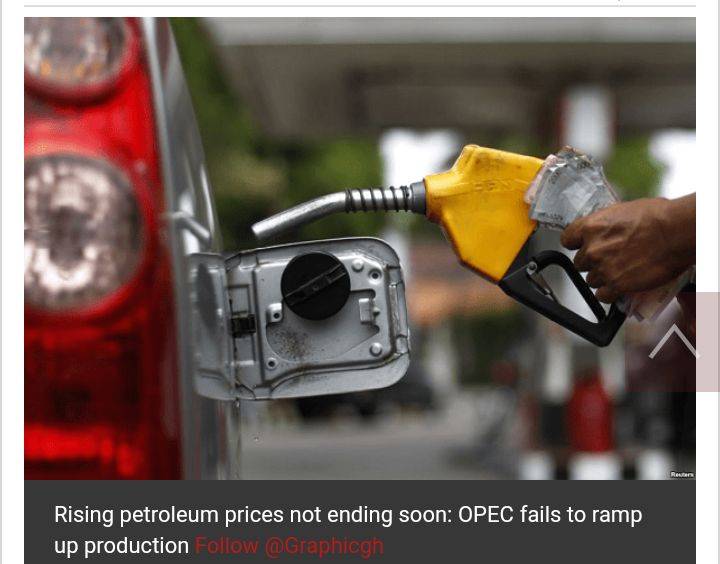Rising petroleum prices not ending soon: OPEC fails to ramp up production
Rising petroleum prices not ending soon: OPEC fails to ramp up production Follow @Graphicgh
Fuel consumers in the country will have to brace themselves up for some more hikes in the prices of petroleum products because the global oil prices are not coming down any time soon.
Since the start of the Russian invasion of Ukraine, members of the Organisation of Oil Producing Countries (OPEC) including the elite members of the organisation, known as OPEC+, have consistently failed to ramp up production to make up for the shortfall in supplies.
With the prices of the black gold still hovering above the $100 mark, the impact is being felt all over the world and Ghana is no exception.
Last Wednesday, it was reported that the rate at which the prices of goods and service rise over a period peaked at 23.6 per cent for the month of April.
This was largely driven by the cost of transportation which was influenced by the rise in the prices of petroleum products in the country.
Much as the people have called for a reduction in the taxes on petroleum products, the government fears such a move will be grievous for the country as it was bound to lose some GH¢4 billion per annum.
OPEC not helping
Reports monitored by the Daily Graphic revealed last Thursday that there is still no hope in sight for OPEC to up production to force prices of crude oil down.
This is because OPEC continues to undershoot its oil production target in the OPEC+ deal, failing in April to boost output as much as required by the agreement to make up for production shortfalls on the international market.
The organisation’s Monthly Oil Market Report (MOMR) showed yesterday that “All 13 members of OPEC — including Iran, Libya and Venezuela exempted from the OPEC+ deal — saw their production rise by just 153,000 barrels per day (bpd) collectively, to 28.648 million bpd in April.”
The top three OPEC producers, Saudi Arabia, Iraq and the UAE, saw the highest increases in their respective oil production last month, while output in Libya plunged by 161,000 bpd to below one million bpd at 913,000 bpd, according to OPEC’s secondary sources.
Libyan oilfields and terminals have again been under blockade in recent weeks amid protests, clashes and disputes over the distribution of oil revenues in the country with two rival governments, incumbent Prime Minister Abdul Hamid Dbeibah refusing to step down for newly sworn-in eastern Prime Minister Fathi Bashaga.
Excluding Libya and the other two producers exempted from the OPEC+ deal, the 10 OPEC members bound by the agreement saw their collective production at 24.464 million bpd in April, OPEC’s figures showed.
This compares with a collective quota for OPEC-10 of 25.315 million bpd for last month.
The gap is more than 800,000 bpd, mostly due to severe underperformance from African members Angola and Nigeria, which have been pumping 300,000 bpd-400,000 bpd below quotas each, for months, due to lack of investment and capacity.
Per OPEC’s secondary sources, the biggest OPEC producer, Saudi Arabia, raised its production by 127,000 bpd to 10.346 million bpd in April, versus a quota nearly 100,000 bpd higher – 10.436 million bpd. The Kingdom, however, self-reported to OPEC higher production, one of 10.441 million bpd.
Secondary sources showed that OPEC’s second-largest producer, Iraq, boosted production by 103,000 bpd to 4.405 million bpd, nearly reaching its April quota of 4.414 million bpd.
Last week, the wider OPEC+ group agreed to leave its production plan unchanged, aiming to boost crude oil production in June by 432,000 bpd, in a move widely expected by the market.
Way forward
While OPEC+ is sticking to its policy of modest monthly increases, many of its members are not pumping to their quotas and the group is estimated to be around 1.5 million bpd below its quota.
This development clearly indicates that there is no end in sight as far as the prices of crude oil dropping below $100 per barrel is concerned.
The effect is that, petroleum prices will remain high and that will impact inflation.
What is necessary to slow the rate of increase will be for the government to manage the exchange rate which is the second major determinant in the pricing of petroleum products in the country.




No comments yet
Be the first to share your thoughts!